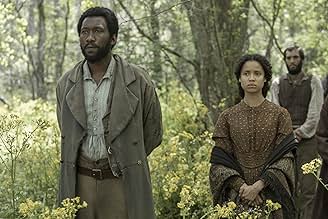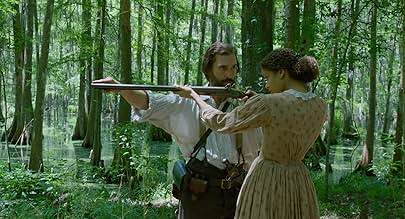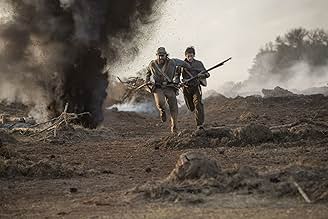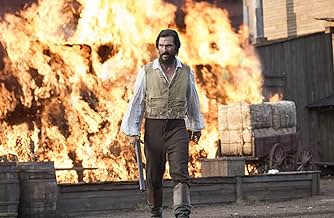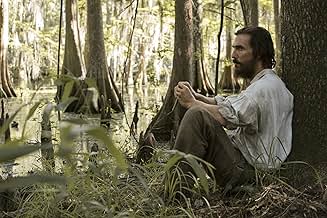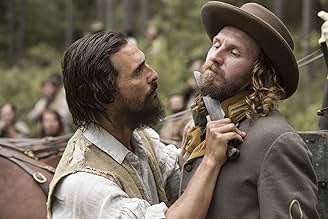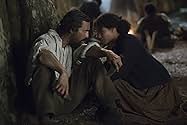Um desertor do exército confederado desiludido retorna ao Mississippi e lidera uma milícia de companheiros desertores e mulheres em um levante contra o governo local da confederação corrupto... Ler tudoUm desertor do exército confederado desiludido retorna ao Mississippi e lidera uma milícia de companheiros desertores e mulheres em um levante contra o governo local da confederação corrupto.Um desertor do exército confederado desiludido retorna ao Mississippi e lidera uma milícia de companheiros desertores e mulheres em um levante contra o governo local da confederação corrupto.
- Direção
- Roteiristas
- Artistas
- Prêmios
- 3 vitórias e 4 indicações no total
- Annie
- (as Jessica Collins)
- Wilson
- (as Donald Watkins)
Avaliações em destaque
The movie starts pretty much like any Civil War movie with battles, death and bloody bodies, but it progresses past that to the point where some people rebel against the Confederacy for the atrocities they commit against the southern farmers. The story is well told with some actual dates and facts flashed on the screen from time to time which sort of gives it the feel of a documentary. It helps keep things in perspective without being intrusive.
If I had anything to complain about, it would be then length and scope of the film. The movie ran about 2-1/2 hours. At about 2 hours, I thought it was over but then it moved into the Klan, voting intimidation and general mistreatment of the freed slaves as well as having a 100 year tie in to future generation. It was as if they tried to jam these events in to make it more politically acceptable to Hollywood. I just felt that they went beyond what the movie was actually to be about.
There were a number of Unionist uprisings in the South during the Civil War (a fact that was carefully expunged from my history textbooks, growing up in the South, maybe to justify all the monuments celebrating the glorious Olde South that lurk around public parks and buildings to intimidate black Southerners - I guess). What other purpose could they possibly serve? To celebrate a defeat?
This movie finally points out the obvious: the Confederacy lost the war, but the planter class which owned the Confederacy did their damnedest to win the peace. Instead of being lynched like Mussolini, Confederate leaders returned to their lives, their plantations, just like the war had never happened. Even the slaves they lost were returned to them in the form of unpaid sharecroppers. The misery of the lives of freedmen is one of the strongest images to take away from this film, their alleged freedom snatched from them. No 40 acres and a mule to serve as some form reparation, they went on to endure a century of domestic terrorism at the hand of the KKK.
The movie itself is beautifully and sensitively acted and filmed. There are scenes of great brutality but which are never gratuitous. There are also scenes of great beauty. There are scenes which have enormous relevance to politics in America today where racism is the hallmark of one Presidential candidate and income inequality the hallmark of another.
Claims by the radical left that this movie is about a "white savior" are just silly. If anything, Gary Ross has eliminated most of the real-life incidents which dealt with Newton Knight's own actions on behalf of freedmen, probably to make the film more palatable to the radical left who, like the extreme right-wing can never be satisfied anyway. I do wish the radical left, rather than criticizing well-intentioned liberals like Gary Ross, would attack the real enemy. The State of Mississippi still incorporates the Confederate flag in its state flag... and social justice warriors are quibbling about degrees of "white saviordom"?
Matthew McConaughey hasn't put a foot wrong since Lincoln Lawyer and his performance here is among his best work. American actors are rarely convincing playing period roles but he totally inhabits the role - scraggly beard, greasy hair, terrible teeth and attitude. He looks like the daguerrotype of a tired and desperate Civil War soldier. Gugu Mbatha-Raw has flown too long under the radar: stunningly touching as an early 19th century biracial heiress in Belle and totally believable as a pop star headed for a nervous breakdown in Beyond the Lights, she brings a luminous quality to Rachel a resourceful woman who defined her own path despite the oppression of racist Southern culture.
Mahershala Ali's character won't be found in Prof. Bynum's books. The names of the maroons who fought with the Knight Company have been lost to history, so he is a composite character invented by Gary Ross. His character travels from runaway slave to armed insurgent to voting rights activist in Reconstruction. Ali imbues his character with wit, charm, warmth and extraordinary courage.
Keri Russell is fine in a small role. She gives her heartbroken character dignity and resilience.
Highly recommended.
It may also be a little too quiet and slow moving for some, but the depth to which the film explores obscure American Civil War facts and events, both during and after, makes one curiouser and curiouser to see where it goes.
This is a rare film that you can watch a trailer of, or not, and not have it ruin the film. In fact, it would be very difficult to anyone to write a spoiler for this. It's also something you want to watch from beginning to end, or at least until the credits shift to white text on black. It may not be the ideal theater film, but it definitely is worthy of a hard copy for your book/DVD shelf.
The movie tells of a counter-rebellion in a Mississippi town during the Civil War, and is based on a true story. The film is done in a style that emulates "Twelve Years A Slave", and as such it deals with topics of slavery and secession in a way that is poignant but also constructive.
In fairness, there are a few things that the film could be rightly critiqued for. The opening scenes of the film are fairly gory and filled with wartime violence, but fortunately that does not dominate the movie. As it progresses, the plot of the film does meander a bit, including a fast forward to a scene from some 85 years after the majority of the film that is interspersed throughout the rest of the movie. That technique felt a bit forced at times, but at the end of the film it made more sense why it had been used.
Additionally, the movie tells its main tale over the course of more than a decade, which makes for a bit of an odd cinematic journey--but, in my view, none of these issues are so problematic that they greatly take away from the movie. Rather, what we have here is a film that was desperately trying to be Oscar worthy, and that perhaps pushes the creative envelope a tad bit too far.
But again, there is more good here than bad. The story that the movie has to tell is both engaging and important--engaging in that it captures your attention and makes you care about the subject matter in a captivating way, and important in that it draws attention to historical facts that you probably were not aware of. I know it certainly highlighted some elements of Reconstruction that were new to me.
Regarding acting, this was perhaps not McConaughey's best role, but it's also not his worst. The supporting cast turns out a strong performance, and all in all the movie is well made.
That said, I'm going with 8/10 stars on this one. It's not the best Civil War flick ever made, and perhaps pales in comparison with other recent historical dramas like "Twelve Years" and "The Revenant", but it's nevertheless a great movie that deserves a "Very Good" score.
Free State of Jones is a very entertaining film for its performances. Mathew McConaughey is often joked about for his intense style but in this role is where you can see why he's an Academy Award winner. Never mind those impersonations of him. He is John Woodroof, he is Newton Knight. There are also very astute performances from Gugu Mbatha-Raw and Mahershala Ali. It has a slew of characters like in any historical drama but thankfully all are in proper proportions. No wonder it comes from the director of The Hunger Games! Another striking quality of the movie is the soundtrack. Use of traditional as well as original songs bring a noticeable gravity to the narrative.
Apart from the brilliant cinematography and direction, this movie has a unique perspective to dealing with a subject as sensitive as this. It transcends the time and period when this story takes place. While the main thread of the narration tells the legendary story of Knight who goes absconding from confederate army and later creates the Free State of Jones in the midst of raging American Civil War, the other thread follows his great-great-great grandson Davis Knight undergoing trial for mixed-race marriage. Yes, even after 85 years, it was still an issue. When you watch it, you'll find the ridiculousness of it, all the more blatant. Well, this review does not mean to judge the laws of the land nor the way of life of the society. However, if at all you are concerned about the historical accuracy of the film then you should know that its one of the very few period dramas that carries this impressive a list of academic consultants to its credit.
The story of the Free State of Jones is not merely fascinating. It's a glorious story of a glorious man. Much like his namesake who discovered theory of Gravity, Newton Knight discovers something about man. You may understand why it could be discomforting to watch if not with an open mind. It is a jab at the ages of segregationist politics, but unlike most films with liberal agendas, it is not cryptic and morose. Its too direct. Too simple to fathom. It doesn't paint Newton Knight as the saviour but only as a hero that he is. He is as deceived and victimized by the system as everyone else. Only difference is that he had an idea way ahead of his times and he had a chance to implement it. Nature was in favour of the man and even when the times were exceptionally odd for his principles to find ground, he endured. Newton Knight went on to live to a ripe old age of 84 which in itself is astonishing in the 1800s. Thank you Gary Ross for sharing this incredible story on silver screen. Too bad it didn't do well commercially.
Você sabia?
- CuriosidadesIn 2016 a document was discovered in the National Archives which was a request by Newton Knight's company to join the Union Army in 1864. It lends validity to Knight's claims.
- Erros de gravaçãoWhen the plantation owner comes back home after the war and walks through the front door, a thermostat is visible on the wall to his left.
- Citações
Newton Knight: From this day forward we declare the land north of Pascagoula Swamp, south of enterprise and east to the Pearl River to the Alabama border, to be a Free State of Jones. And as such we do hereby proclaim and affirm the following principles. Number one, no man ought to stay poor so another man can get rich. Number two, no man ought to tell another man what you got to live for or what he's got to die for. Number three, what you put in the ground is yours to tend and harvest and there ain't no man ought to be able to take that away from you. Number four, every man is a man. If you walk on two legs, you're a man. It's as simple as that.
- ConexõesFeatured in The History of Jones County (2016)
- Trilhas sonorasBeautiful Dreamer
Written by Stephen Foster
Principais escolhas
- How long is Free State of Jones?Fornecido pela Alexa
Detalhes
- Data de lançamento
- Países de origem
- Centrais de atendimento oficiais
- Idioma
- Também conhecido como
- Lucha por la libertad
- Locações de filme
- Empresas de produção
- Consulte mais créditos da empresa na IMDbPro
Bilheteria
- Orçamento
- US$ 50.000.000 (estimativa)
- Faturamento bruto nos EUA e Canadá
- US$ 20.810.036
- Fim de semana de estreia nos EUA e Canadá
- US$ 7.572.206
- 26 de jun. de 2016
- Faturamento bruto mundial
- US$ 25.035.950
- Tempo de duração
- 2 h 19 min(139 min)
- Cor
- Proporção
- 1.85 : 1







